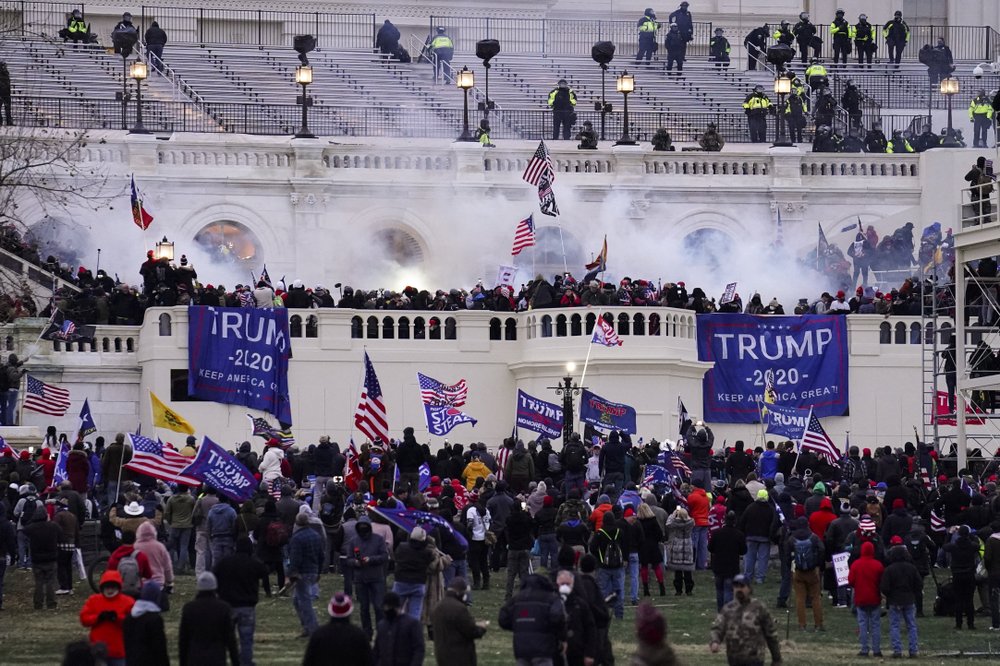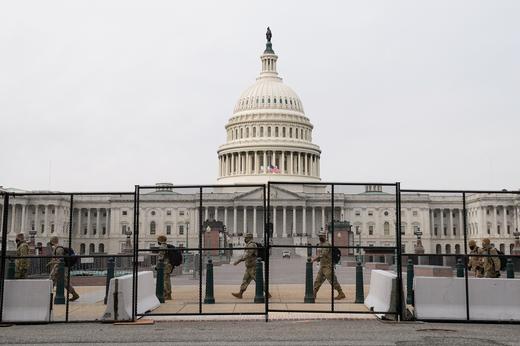
Violent protesters, loyal to President Donald Trump, storm the Capitol, in Washington D.C., U.S., January 6, 2021. /AP
Violent protesters, loyal to President Donald Trump, storm the Capitol, in Washington D.C., U.S., January 6, 2021. /AP
Sitting U.S. President Donald Trump approved an emergency declaration for Washington, D.C. from Monday through January 24, according to the White House.
The White House said the president has ordered federal assistance to supplement response efforts.
The move comes after authorities warned of security threats to President-elect Joe Biden's inauguration next week.
FBI warning
The FBI also warned of plans for armed protests at all 50 state capitals and in Washington, D.C., in the days leading up to Biden's inauguration on Monday.
An internal FBI bulletin, first revealed by ABC, warned, as of Sunday, that the nationwide protests may start later this week and extend through Biden's January 20 inauguration. Investigators believe some of the people are members of extremist groups, the officials said.
"Armed protests are being planned at all 50 state capitols from January 16 through at least January 20, and at the U.S. Capitol from January 17 through January 20," the bulletin said, according to an AP source.
The FBI issued at least one other bulletin before the riots last week. On December 29, it warned of the potential for armed demonstrators targeting legislatures, the second official said.
"While our standard practice is to not comment on specific intelligence products, the FBI is supporting our state, local, and federal law enforcement partners with maintaining public safety in the communities we serve," the bureau said in a statement. "Our efforts are focused on identifying, investigating, and disrupting individuals that are inciting violence and engaging in criminal activity."
The FBI said it wasn't focused on peaceful protests but "on those threatening their safety and the safety of other citizens with violence and destruction of property."

Security fencing surrounds the U.S. Capitol days after supporters of U.S. President Donald Trump stormed the Capitol in Washington, D.C., U.S., January 11, 2021. /Reuters
Security fencing surrounds the U.S. Capitol days after supporters of U.S. President Donald Trump stormed the Capitol in Washington, D.C., U.S., January 11, 2021. /Reuters
To safeguard the U.S. capital, the National Guard was authorized to send up to 15,000 troops to Washington, and tourists were barred from visiting the Washington Monument until January 24.
The chief of the National Guard Bureau, General Daniel Hokanson, told reporters he expected about 10,000 troops in Washington by Saturday to help provide security, logistics and communications.
He said the number could rise to 15,000 if requested by local authorities.
Hokanson told reporters Monday that the Guard is also "keeping a look across the entire country," and to make sure that "our Guards in every state are in close coordination with their local law enforcement agencies to provide any support requested."
The riots followed weeks of online calls for violence in the nation's capital in the waning days of Trump's presidency. There have been several arrests, and at least two Capitol police officers, one who took a selfie with rioters, and another who put on a Make America Great Again hat, were suspended. At least a dozen more are under investigation, according to lawmakers.
A tweet in which Trump promised that last Wednesday's event in Washington, D.C., "will be wild" fueled a "month-long frenzy of incitements, strategizing, and embrace of violence against lawmakers," according to a research group that tracks online extremism activity. In a report issued Saturday, the SITE Intelligence Group also warned that the Capitol attack has emboldened Trump-supporting extremists.
"No matter how all this plays out, it's only the beginning," posted a user on TheDonald message board, according to the report.
Mark Pitcavage, a senior research fellow at the Anti-Defamation League's Center on Extremism, said authorities in state capitals and other major cities besides Washington should prepare for the possibility of violent protests next week.
"A lot of people were energized by what happened last week," he said. "State capitals are a natural place where people might want to show up, especially assuming that they think there might be a huge presence of police and military in D.C. because of what happened last week."
Javed Ali, a former FBI senior intelligence officer who teaches courses in counterterrorism at the University of Michigan, said it can be challenging for law enforcement to identify the line between people exercising their constitutionally protected rights to bear arms and free speech and those who pose "a real operational threat".
"The FBI just can't passively sit in websites and forums and social media platforms, waiting to see who's going to present a direct threat versus just someone who is being highly radicalized," he said. "There has to be an investigative predicate for the FBI to then start even the lowest form of an investigation."
(With input from agencies)

